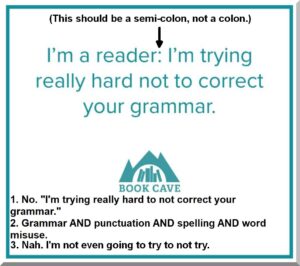
I was blessed (though some seem to think “cursed”) to be raised in a family of literates, and not just “functionally literate,” but liberally-seeded with formally literate adults, and eventually (sometimes) not-too-shabbily-literate sibs. Combine that with the fact that I am an Odd1 and my life has continually been filled with bafflement when confronted with folks who, quite apart from literacy, aren’t even fluent in English, when it’s their native tongue!
So, yeh2, I spend way more time than is probably healthy listening around some folks’ grammar. But. . . about that word. *sigh* I do really tire of folks misusing it to the point that it has now lost a usefully distinctive meaning. Nowadays, it seems to be used primarily either in a pejorative sense in the phrase “grammar Nazi” to mean someone who is picky and offensive about language and who often corrects others’ misusages. And in that vein, “grammar” is generally misused to be a reference to any correctly spoken or orthographical speech or writing.
Nope. Grammar is “A set of rules and examples dealing with the syntax and word structures of a language. . . “3 Oh, it is more than that, and in common usage nowadays it is. . . much, much less. *sigh*
So, I am bothered not by the pesky gnats of syntax alone, but illiterate word misuses, bafflingly stupid punctuation (in writing, of course, although the way some speak weirdly placed commas can also be heard *heh*), and nonsensical neologisms**. Add to that the creation of subcultures with “lects” that are both independent of regional dialects and that seem to be structured specifically to utter nonsense (LitRPG/gamers for example, though not the only example; there is the “Friends” dialect as another example) and call it English, the popularized illiteracy/subliteracy/pseudo-literacy prevalent in the Mass Media Podpeople Hivemind, bureaucratese, lying liars who illiterately lie (A.K.A. politicians), and English seems to be in dire straits.
Oh, well. Rage, rage against the dying of the light. *heh*
(Oh, and just a wee lil “BTW,” here: “I’m trying really hard not to correct your grammar,” really should read “I’m trying really hard to not correct your grammar,” even though I really don’t try at all. . . )
Better:

2 Yeh, I find “yeh” to be a better representation of the expression than “yeah.” So sue me. It sounds to my ear more like what folks actually say.


